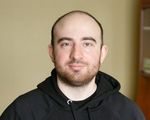About Success Builder
How do you find your place in life? How do you find something to do that both comes naturally to you and makes you happy? The answer is that you have to apply the knowledge you’ve gained from university and from life itself correctly. The Success Builder Project features HSE University graduates who have discovered themselves through an interesting business or an unexpected profession. The protagonists share their experiences and lessons learnt and talk about how they’ve made the most of the opportunities they were given.
Dmitry Samusev managed to get the best from two economics schools — HSE University and the Helsinki School of Economics — and become a true management expert in the process. He is currently purchasing director for Proctor & Gamble. In this interview with Success Builder, he explained why a change of climate is good for Russian students, how self-confidence helps in job interviews and what’s good about working for an international giant.
What motivated you to get a degree in management?
It was interesting for me to study something related to the humanities and to get a practical education at the same time. It was 2005, entrepreneurship was popular and my parents were in business. HSE was perhaps the most well-known and progressive economics university already. All that was left for me was to choose a major. I definitely didn’t see myself at the Faculty of Economics—finance with econometrics and models somehow wasn’t attractive to me; I wanted to gain knowledge that would have direct application in the real world. It became obvious that management was the field for me.
At that time, I wasn’t very interested in the content of the programme; I went to HSE University for the name, although the international stature of the programme was clearly a big advantage. My acquaintances who were seniors in Management at HSE University said it was a hands-on type of programme and that it opened doors to the job market. To ensure I got in, I attended a university prep course and began studying intensively.
How easy was it at HSE to manage with your studies, get along with other students and adapt?
The university prep course helped me in every way. Many of my fellow students were admitted and studied in the same department, and some were even in the Faculty of Management. As it turned out, my own social adaptation went so smoothly that I hardly noticed it. As a disciplined person, I took a constructive approach to my studies right from the start. But there was one problem: I was always bad at subjects I didn’t like. And microeconomics and everything that had an academic context became a real challenge for me. It is difficult to assimilate information when it is unclear how it can be applied. I was saved by subjects with practical aspects and by very devoted teachers who tried to turn fundamental and academic topics into something closer to real life.
What turned out to be the most applied aspect of your education?
At that time, unfortunately, few practitioners came to give lectures to students. Several people from business and industry taught classes and seminars and their experience struck me as very valuable. Of the various subjects, linear algebra and mathematics—which is ubiquitous—later came in handy in my work. And when I came to work in business, I really appreciated strategic management, on which all management processes are built to this day.
We also had management decision-making classes that taught the basics of project analysis, which is a very important tool for predicting whether a project will be commercially successful and for calculating risks. The financial management course was very helpful because it taught me how to use precise calculations to ensure that a business idea was ‘grounded’.
When did you start thinking about a career? Where did you want to work?
Almost all of my classmates combined study with work. I did some part-time work and even opened my own online store, but I realised that I didn’t want to get entrepreneurial experience from scratch—it’s wiser to go work in someone else’s well-established business. On the other hand, in order to raise my rating in the eyes of a major employer, it was necessary to strengthen my professional status through a master's degree and develop a theoretical and project base. At the same time, I didn’t have a goal to get into the FMCG sector; rather, I wanted to get into consulting. As a result, I began to prepare for admission to a master’s program abroad, and I can say that studying at HSE University was very helpful in this regard.
HSE University teaches the fundamentals of management in much greater depth and breadth than at European universities
When I was admitted and began studying at the Helsinki School of Economics, I felt much more confident than other students in many ways. Although some of the economics students had more in-depth knowledge in specific areas, my strengths in the international business programme were clearly my knowledge of various disciplines and tools of strategic and project management. On such a foundation, I could build on the many useful courses and gain a deeper mastery of new subjects, which doubled the usefulness of the master’s degree.
Why did you study abroad? What was interesting about the Helsinki School of Economics?
At that time, Russia was adopting the Bologna Process, with the result that nobody considered an education to be complete without a master’s degree. During my fourth year, I applied to master’s programmes in both Europe and HSE University and ended up being accepted by both. I chose to travel and study at the Helsinki School of Economics because it gave me the experience of something completely new in a different environment, studies in English, a different climate and an unfamiliar educational system. All this gave my thinking a positive jolt and helped me look at familiar things with new eyes.
I was interested in the International Business Programme because its courses were largely devoted to the analysis of the development of global corporations, the study of strategic orientation and project management. You could also choose among minors. All this could be combined within the framework of strategic management, which was exactly what interested me.
Was the programme especially beneficial in some way?
Interestingly, at 21, I was the youngest student. In Europe, a bachelor’s degree is considered a full-fledged education, after which people go to work. As a rule, students enter a master’s programme to get retrained or prepare for a PhD; it is a conscious choice made by people who are already adults. As a result, most students have experience working, volunteering, traveling and taking part in cultural exchanges. They know several languages and understand what they want from life. This is a very useful and nurturing environment, where at first I felt like a guy from the outback, but over time my horizons broadened incredibly.
When people ask me what I would advise today’s students, I always say: take advantage of international exchange opportunities
This is because it’s a different context, where people view everything with a fresh outlook, more positively, more openly, and it changes you a lot. The programme itself is interesting primarily because almost all lecturers are business practitioners or researchers from corporate laboratories. There were a lot of guest speakers from well-known global corporations. The lecture by the CEO of Wärtsilä, which is the world leader in the production of heavy engines for shipping, was very memorable. The experience of working with case studies turned out to be useful, especially on the topic of bringing a business to the markets of developing countries.
The cardinal difference that I noted between the two systems of education is that the European approach is much less fundamental and highly specialised, with a minimum of special disciplines. Also, classes are almost always focused on communication, making friends and professional relationships; you have to constantly leave your comfort zone and learn to be open. As a rule, European university education rests on the responsibility of the student himself; no one will ‘kick’ you and force you to study. Everyone does what he needs, based on his own goal.
In Europe, people get a master’s degree not because they have to, but because they want to
Students take their successes and failures in stride; no one freaks out if they get a ‘9’ instead of a ‘10’ because everyone understands clearly how it will help them later in life. For me, it was an experience of rethinking important university values. This helped me to absorb and combine the best of them while discarding the superfluous. It was a very useful life experience in general.
How did the European master’s programme affect your career opportunities?
In the simplest sense, studying abroad gave me confidence that helped in interviews. I could easily demonstrate my broad outlook, knowledge, experience with cool cases and quick thinking and talk about how I interacted with practitioners from the best global companies in my classes. All this is reinforced by university diplomas and gives people an unquestioning faith in you. Having international experience allowed me to navigate both local and global settings and to establish communication in various business formats. I think this is one of the most important skills that comes from studying in different geographical locations and cultural environments. You gain a deeper understanding of the core of economic processes because they are all tied to people. So, after returning from Helsinki, it was much easier for me to do well in interviews.
Why is it interesting to work for a major corporation?
Working in an international giant is a great investment in your portfolio. For me, it is important what the company’s philosophy is, how it builds relationships in the team, how it promotes products and how it treats the consumer. Right from the start, I was offered an interesting and promising position in exactly the area I wanted—managing complex projects and teams.
A huge advantage of the work turned out to be that I’m constantly meeting multiple objectives, something new is constantly happening and I am constantly moving from one position to another and developing with great enthusiasm. I always say that I work in the same field that I majored in: I am a professional manager; this is what I was taught and it applies at all levels. First, you apply managerial qualities to yourself, manage risks, try your hand at different projects and think about how to overcome crises. Then you start managing your environment; you grow and manage entire organisations. You have a team for which you are responsible and you understand that now your success is their success. Management is all about people and that’s why I find it so interesting.
In this sense, working for a large company and having major responsibilities has truly become a way to realise my potential. If you can build a long-term vision for an idea and lead a team, this is the biggest reward for a person who has studied management at HSE University or anywhere else: you understand that you didn’t just sit in the classroom for so many years.
How easy or desirable is it for a specialist to constantly change positions and objectives?
The desire to learn new things comes from the specialist himself and is supported by management. No one will force you to move from position to position without your consent. Personally, from the very beginning, I was comfortable developing in every possible area. Any large company has its own principles and rules for the development of employees. These are subject to certain factors, such as the speed of learning, potential in managerial tasks, business benefits from employee relocation, etc. Every employee is constantly exchanging data with management. You voice your desires and the company matches those requests against the reality of the situation.
I spent four years in procurement and then concluded that I wanted to manage people. So I was sent to production in a distribution center where I managed a huge workshop with more than 100 subordinates
I had to learn a bunch of new things almost instantly: budgeting, safety and quality rules in production, management methods, and understand how the equipment and systems entrusted to me work. There’s no way you can prepare for this; you just have to come and do it, learning at every step. I wasn’t afraid; on the contrary, I liked this turn of events. I realised how multifaceted the company is and how much you can do in it.
Now I am the purchasing director and manage several teams. To put it simply, our task is to provide a high quality service with the right balance of prices and labor costs. My job is mainly to get the teams’ priorities right. I love working with people, motivating them and uniting them with common goals. I see talented employees around me who produce results and give me a deeper understanding of my own role in business.














































































































































